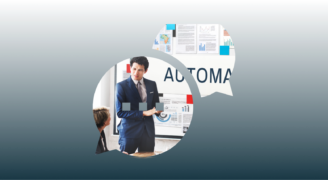In the construction industry, where projects are often large, complex, and involve multiple stakeholders, effective management tools are essential. Coordinating manpower, materials, and machinery is challenging, making it crucial to have the right systems in place.
To stay competitive, construction companies are increasingly relying on dedicated ERP software that streamlines key processes like project management, inventory control, and financial oversight. This specialized software isn't just helpful, it's a necessity in today's fast-paced and competitive market.
How Does ERP Help Construction Businesses?
Standardizing your workflow is crucial, especially in the construction business where companies are brainstorming cost-cutting strategies. ERP (Enterprise Resource Planning) software is an integrated system that helps manage a company’s major business processes in real-time.
For construction companies, this includes everything from project management and financials to supply chain operations and human resources.
An ERP software like Oracle NetSuite can help you achieve this goal with its state-of-the-art tools. These include streamlined financials, seamless integration, and a 360-degree view of the business operations.
Here’s how ERP software specifically benefits construction companies:
1. Modernize Operations
One of the key advantages of implementing ERP software is the modernization of operations. Automation is essential for streamlining processes, especially in an industry where human errors can be costly. This becomes even more critical for larger companies with multiple subsidiaries and construction sites.
An effective ERP solution, like NetSuite, can act as a mountain-mover. It consolidates all your data into a single database, reducing the risk of errors, and saving valuable time and money.
2. Advanced Project Management
Construction projects often operate under tight budgets and strict deadlines. This makes advanced project management systems vital. An ERP system provides the tools needed to handle asset records efficiently, ensuring a smooth workflow. Any deviation from the planned schedule can lead to significant financial and reputational losses.
Teams can collaborate more effectively with real-time updates and shared information, reducing the risk of miscommunication or delays.
For instance, poor planning, high labor costs, and delays in project completion can severely impact a contractor badly. By using an ERP system, construction companies can better manage raw material procurement and allocation, optimize labor use, and create detailed schedules. This leads to more effective resource allocation and project execution.
Additionally, ERP systems like NetSuite offer role-based access, allowing users to control operations seamlessly from anywhere, at any time.
3. Seamless Data Management
Data management across multiple systems can be a major challenge in the construction industry. An ERP system provides a dynamic platform that integrates data from various sources, such as labor, inventory, and finances, into one centralized system. This consolidated data allows managers to make informed decisions, streamline operations, and reduce inefficiencies.
The ability to generate customizable reports on various aspects of the business, from project progress to financial health. This empowers construction firms to make strategic decisions.
4. Reducing Unwanted Expenses
ERP software provides real-time data that can be leveraged to project both actual and potential expenses. This insight enhances the planning process, helping to minimize waste by identifying the most cost-effective ways to utilize resources. By forecasting expenses accurately, construction companies can better manage their budgets and avoid unnecessary costs.
5. Customization
In today’s rapidly changing world, customization is essential. Different construction companies have unique needs and functions, and a one-size-fits-all approach will not work. Leading ERP systems, such as NetSuite, offer customizable dashboards that can be integrated with various tools. This flexibility improves analytical capabilities, making it easier to estimate costs, plan projects, and adapt to changing demands.
6. Improved Compliance and Risk Management
Construction companies must comply with various regulations and safety standards. ERP software helps track compliance and ensures that all necessary documentation is up to
By providing a holistic view of the project, ERP software enables companies to identify potential risks early and take preventive measures.
7. Return on Investment
Implementing ERP software can drastically reduce human errors and provide critical insights into key aspects of the business, such as cash flow, cost overruns, and milestone payments.
These insights are crucial for the construction industry, where real-time, integrated views of operations can enhance efficiency and reduce downtime.
Additionally, modern ERP systems come equipped with advanced business intelligence and reporting features. These tools not only identify gaps in the system but also highlight areas of strength, enabling companies to maximize their return on investment.
How to Choose a Construction ERP System?
Choosing the right partner is a crucial turn while considering an efficient construction tech. It is critical that an ERP system chosen for a construction company specifically addresses the particular requirements of the construction sector.
A fundamental Checklist is needed to understand some of the core processes that you can expect from an ERP system.
- Project Management Tools: Ensure that the ERP offers comprehensive project management features such as task assignment, scheduling, progress tracking, and resource allocation.
- Financial Management Modules: Look for robust financial management features in the software such as budgeting, accounting, payroll, and financial reporting.
- Supply Chain Management: Expertise in procurement, inventories, and supplier relationship management.
- Mobile Access: Since construction work is generally done on-site, having mobile ERP access allowing for real-time updates and data access is a huge advantage.
- Scalability: Select a system that can scale with your business. The software must be able to accommodate growing workloads and projects.
- Real-time Communication: Ensure that the software enables real-time communication with stakeholders and quicker decision-making.
- Fixed asset management: One that manages and tracks fixed assets like machinery and equipment, ensuring optimal utilization.
- Cloud-based ERP systems are a necessity in the modern world. Although on-premises systems are still available, choose a cloud platform for timely updations, zero maintenance costs, and robust security features. Cloud ERPs like NetSuite are highly scalable, allowing your ERP system to grow with your organization.
- Ease of Use is not often stressed enough when considering ERP systems. The ERP system should be intuitive and easy to use, reducing the learning curve and ensuring that your team can quickly adopt it. A customizable interface is also important, allowing the software to be tailored to your specific needs without adding unnecessary complexity.
Is NetSuite Right for My Construction Company?
If you are looking for a scalable, customizable, cloud ERP platform, Oracle NetSuite could be the ideal solution for your business. NetSuite offers a comprehensive ecosystem that includes applications such as CRM, PSA, Payroll, Finance, and HR, all of which can seamlessly integrate with your existing legacy systems.
If you’re familiar with the complexities of job costing, you’ll appreciate that NetSuite not only handles all your accounting needs but also provides advanced projections through its KPI dashboards.
Here are a few key reasons to consider NetSuite for your construction projects:
• Advanced Financial Management
Comprehensive Accounting: NetSuite offers robust accounting capabilities, perfect for managing back-office operations like Project Cost Management, payment processing, General Leger, and tax management. It's also equipped to handle the complexities of multi-entity organizations, including support for multiple currencies and tax jurisdictions.
Job Cost Accounting: Gain detailed insights into job costs with NetSuite’s advanced tracking features, including cost-to-completion, cost-at-completion, and progress level analysis. This helps you accurately assess project estimates and profitability.
• Regular Updates & Cost Effective
Continuous Improvement: NetSuite regularly releases updates with new features that enhance functionality. These updates are implemented in the cloud, ensuring minimal disruption to your business processes. Considering the ROI, the cost of these updates is highly justified.
Cloud Benefits: The cloud-based nature of NetSuite means no on-premise hardware or maintenance costs, with updates automatically rolled out without downtime.
• Seamless Integration
Legacy System Compatibility: NetSuite’s ability to integrate with legacy systems is a significant advantage. This ensures that valuable historical data is preserved and can be effectively used for creating data models, avoiding the loss of crucial information.
Enhanced Management: By integrating NetSuite with other systems, you create a unified platform that streamlines data from various sources, improving overall efficiency and decision-making.
• In-depth Visibility & Improved Accessibility
Real-Time Data Access: NetSuite provides real-time visibility across all departments, including marketing, inventory, accounting, and client management. By eliminating silos, it ensures that all data is consolidated into a single system, facilitating smoother inter-departmental communication and boosting productivity.
Global Access: As a cloud-based platform, NetSuite allows users to access data from anywhere in the world, enhancing decision-making capabilities and operational flexibility.
• Intercompany Consolidation
Streamlined Multi-Company Management: With NetSuite Oneworld, you can manage financial consolidation across multiple companies in real-time. This module allows you to drill down into all levels of a multi-entity business, providing comprehensive insights across all your companies.
• Customizing NetSuite ERP for Construction
Tailored to Your Needs: NetSuite can be customized to align with the unique processes of your construction business. Essential features such as job cost accounting, AIA invoicing, and Schedule of Values can be adapted to meet your specific needs. For financial management, options like partial payments and advanced revenue recognition can be configured based on your requirements.
• Management integration with MSI Data
Field Service Optimization: Integrating field service management software with NetSuite eliminates time-consuming manual data entry and reconciliation processes. Once integrated, the service module facilitates rapid inspections and preventive maintenance, reducing the likelihood of unexpected expenses and ensuring that equipment repairs are handled efficiently.
Wrapping Up
If you want to learn more about the vast features offered by NetSuite ERP and its benefits, or how it can be tailored to your construction business, feel free to contact our experts. We, at Jobin & Jismi, are here to assist you.



